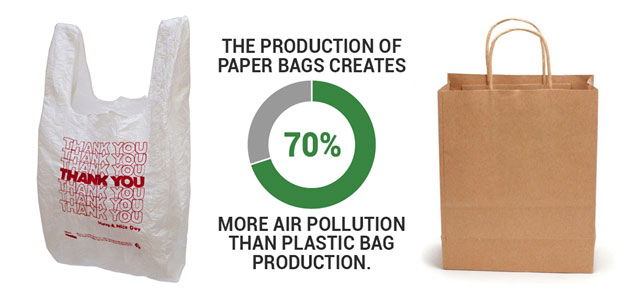
Many believe that single-use paper bags are more environmentally friendly since they are biodegradable, recyclable, and made from a renewable resource. However, the fact is that the extensive use of paper bags is more harmful to the environment. Form manufacturing to solid waste volume, reuse, and waste generation, plastic bags perform better than paper bags on every level and that is a fact. Let us look at why this is the case.
1) On Manufacturing & Resource Use: Paper Use More Resources
- According to this research paper, paper bags take 4 times as much energy to manufacture.
- It is much more resource-intensive to manufacture paper than plastic as it consumes huge amounts of water and energy.
- The EcoBilan Carrefour Life Cycle Assessment states that paper bag manufacture emits 3.3 times more greenhouse gases and 2.7 times more acid gases.
- Plastic bags, on the other hand, was created as an alternative to paper bags to prevent deforestation and protect trees.
2) On Reuse: Plastic Outperforms Paper
- The idea of using bags is to minimize environmental impact and reuse it multiple times. However, when it comes to the reuse of paper bags, they fail big time as they are not waterproof and can easily tear.
- Paper bag use has increased global warming potential (GWP). They contribute 3 times more to global warming than plastic shopping bags.
- Plastic bags are durable, highly reusable, with a reuse rate of almost 40.3%.
3) On Solid Waste: Paper Generates More Waste
- The most immediate and negative impact of using paper bags instead of plastic ones is the tonnage and volume that paper contributes to that waste stream.
- Paper bags are usually heavier than plastic ones, where a grocery paper bag can weigh up to 55 grams, a typical shopping plastic bag only weighs 6-8 grams.
- This extra volume can correlate directly to a huge rise in the number of greenhouse emissions produced to transport paper bags. For instance, it can take only a single truck to transport 2 million plastic bags. In the case of paper bags, it can take 7 trucks to carry 2 million paper bags.
- The use of paper bags also leads to increased recycling and waste management costs.
4) On Recycling: Plastic Bags Have Higher Recycling Rates
- Paper bags can degrade easily with continued recycling. This is not so with plastic bags.
- Plastic bags minimize material use, energy consumption, and can promote recycling.
- Compared to paper bags, plastic bags have the highest acceptance rating for recycling.
With single-use plastic bags, you can expect better durability, cost-effectiveness, reduced carbon emissions, less waste generation, and higher reusability. In the long run, the use of plastics over paper bags is bound to go hand in hand with convenience and sustainability.

